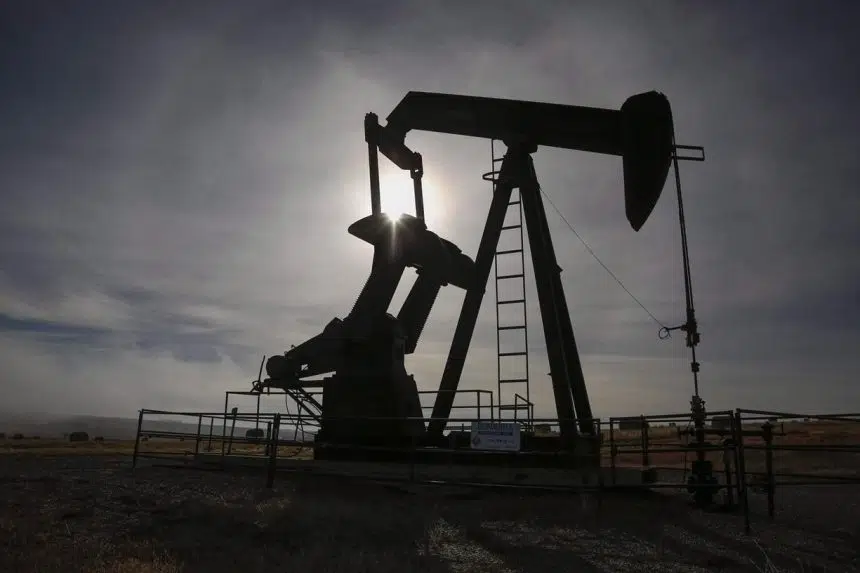A new report puts numbers onto the economic harms the Saskatchewan Economic Assessment Tribunal believes will be visited on the province by a proposed oil and gas emissions cap and Methane 75 regulations.
“This is about evidence, it’s about independent evidence, and it’s about evidence that we need to challenge federal damaging policies which the federal government cannot actually constitutionally mandate,” said Justice Minister Bronwyn Eyre on Tuesday.
The tribunal looked at the impacts by 2050 on oil and gas production, GDP, employment, government revenue, royalty and tax revenue, compliance costs, and oil and gas investment. It found a wide range of possible impacts.
The report estimated that oil and gas production would see a 7 to 52 per cent reduction by 2050, and a 1.5 to 6.4 per cent reduction in provincial GDP for a cumulative reduction of $34.5 to $230 billion.
Employment in Saskatchewan could see a reduction of 12,785 to 34,000 jobs, and estimated government revenues would be negatively impacted by $1.1 to $2 billion, for a cumulative negative impact total of $9.2 to $43.3 billion by 2050, and royalty and tax revenue could have a cumulative negative impact of $3.2 to $7.1 billion in that time period.
The tribunal estimated the compliance costs could rise to a cumulative $8.9 to $67.3 billion by 2050, and the negative impact to oil and gas investment by 2050 could get to a cumulative $19.5 to $45.8 billion.

Justice Minister Bronwyn Eyre said it’s the provincial government’s job to keep an eye on harms like those in the report. (The Canadian Press)
Report provides ‘powerful evidence
Eyre called findings from the report dramatic, saying the regulations just add costs to the sector for the sake of adding costs.
She also pointed out, as she has many times before, that her government believes natural resources are a purely provincial jurisdiction and the federal government is trying to push in.
Eyre said it’s the provincial government’s job to keep an eye on harms like these.
“Quebec would do it, so why can’t Saskatchewan? If we don’t say it and highlight the problem, and highlight the harm, who does?” asked Eyre.
She said the report will serve as “powerful” evidence but wasn’t specific on what the provincial government will do with the information. The minster said there are several possibilities, like another reference case or a judicial review of the regulations.
“It arms us with very strong evidence to make that case that not only is this constitutionally unacceptable and untenable, but it’s also deeply harmful to the province of Saskatchewan,” said Eyre.
She said this doesn’t mean the oil and gas industry shouldn’t have any regulation at all, and again pointed to the separation of jurisdictions between the governments. She also spoke several times about headway the province has already made in reducing emissions.
The federal regulations are not finalized yet, the tribunal’s report is based on draft regulations. The final regulations are expected to be presented this fall.
The report also says “the scope of all economic modelling is inherently limited, and that the results are influenced markedly by the assumptions made and variables applied.”

Environment and Climate Change Minister Steven Guilbeault. (THE CANADIAN PRESS/Patrick Doyle)
Tribunal politicizing, says federal minister
Federal Environment Minister Steven Guilbeault’s office said in an email the tribunal was launched with an ideological agenda to build a fight with the federal government.
“Clearly, the release of this report on the eve of a provincial election is an attempt to politicize measures such as the methane regulations, which the Saskatchewan and the federal government have collaborated on,” read the statement.
It went on to point out that the federal government was worked with the province on two equivalency agreements on methane emissions, including one earlier in 2024 which replace federal regulations with provincial ones.
“We have always worked in good faith with the Government of Saskatchewan and will continue to do so when it comes to the emissions cap for the oil and gas sector, which is focused on reducing oil and gas emissions, not production,” the statement said.
The submission the federal government sent in to the tribunal included its preliminary numbers. It said the total incremental costs would be $15.8 billion, but it pegged the benefits associated with greenhouse gas emissions reductions at $27.8 billion, which was calculated from the social benefits of avoiding the global damages from climate change.
Environment and Climate Change Canada put the net benefits of the proposed amendments at $12.4 billion. It also put the compliance costs at $4.2 billion for the province by 2040, and it did admit there would be higher costs and impacts for provinces like Saskatchewan.

Saskatchewan Association of Rural Municipalities (SARM) said the regulations could create higher utility rates. (THE CANADIAN PRESS/AP Photo/dpa, Julian Stratenschulte)
126 asked for input, 16 included in report
Eyre said more than 400 hours of work went into the creation of this report.
The tribunal sent letters to 126 groups for their input — they included chambers of commerce and governing bodies like Saskatchewan Association of Rural Municipalities (SARM) and Federation of Sovereign Indigenous Nations (FSIN), as well as the federal environment minister’s office, oil and gas and natural resource companies, industry groups and advocates.
Responses from 16 entities were included in the report, all but three were from groups within the resource sector, and all except the federal government’s response were opposed to the federal regulations.
The companies talked about the regulations being technically unfeasible and financially burdensome, that they would impeded innovation and, in some cases, force companies to cut production.
The Sask. Chamber of Commerce said the requirements from the regulations would duplicate others and be disruptive for businesses, while SARM said the regulations could create higher utility rates.
The reason the federal government is putting forward these regulations is to combat the negative effects of climate change, though not all those giving their two cents to the tribunal believe in the science of climate change, one saying in his letter that it is “mostly nonsense and should be treated as such”.
Read more











